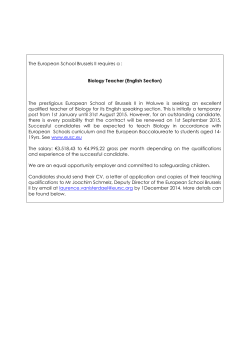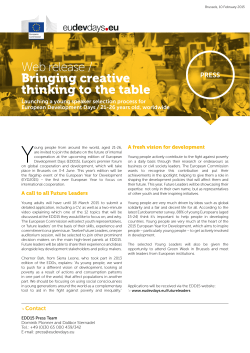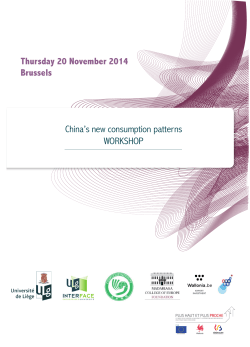
EU Council Working Party on Public Health at Senior
EU Council Working Party on Public Health at Senior Level Brussels, 17 February 2015 Hans Kluge, Sarah Thomson Division of Health Systems and Public Health Working Party on Public Health at Senior Level Brussels, 17 February 2015 Joint WHO-Observatory study on the crisis Economic crisis, health systems, and health in Europe What did we expect? High-level meetings held in Oslo in 2009 and 2013 What did we find? What lessons for policy? Working Party on Public Health at Senior Level Brussels, 17 February 2015 Evidence from earlier economic shocks • They affect health but don’t affect everyone equally: health worsens in people who lose jobs • Negative effects can be mitigated • Countercyclical public social spending is critical: greater need for services, greater reliance on publicly financed services • Protecting access to health care is critical, especially for those at risk of job loss, poverty Working Party on Public Health at Senior Level Brussels, 17 February 2015 Decline in public spending on health: often small, sometimes sustained 4 3 Years of decline in public spending on health per person, 2007-2012: EU28 1 0 Austria Belgium Finland France Germany Netherlands Poland Slovakia Sweden United Kingdom Bulgaria Czech Republic Denmark Malta Cyprus Estonia Hungary Italy Latvia Lithuania Luxembourg Portugal Slovenia Spain Croatia Greece Romania Ireland Years 2 Source: Thomson et al 2014 using datafrom the WHO Global Health Expenditure Database Working Party on Public Health at Senior Level Brussels, 17 February 2015 Decline in public spending on health: often small, sometimes severe Annual change in public spending on health per person, 2007-2012: countries in which 2012 < 2007 20% Percentage points 15% 10% 5% 0% -5% -10% -15% -20% Ireland Greece Latvia Croatia Portugal Source: Thomson et al 2014 using data from the WHO Global Health Expenditure Database Working Party on Public Health at Senior Level Brussels, 17 February 2015 50 20 % 10 -20 Armenia Latvia Ireland Azerbaijan Montenegro Kyrgyzstan Turkmenistan Luxembourg Iceland Croatia Portugal Greece Ukraine Slovenia Spain fYR Macedonia Denmark Slovakia Norway Lithuania Finland Malta Russian Federation France San Marino Andorra Romania Hungary Serbia Netherlands United Kingdom Italy Belgium Germany Israel Poland Turkey Austria Sweden Estonia Czech Republic Cyprus Albania Bulgaria Switzerland Republic of Moldova Uzbekistan Bosnia Herzegovina Monaco Georgia Kazakhstan Belarus Tajikistan Evidence of pro-cyclical public spending on health Change in the health share (%) of total government spending 2007-2011 40 30 Pro-cyclical public spending on health (including in 13 EU countries) 0 -10 Counterycyclical public spending on health -30 Working Party on Public Health at Senior Level Brussels, 17 February 2015 Source: Thomson et al 2014 using data from the WHO Global Health Expenditure Database Annual change in public spending on different health services, 2007-2011 Large cuts to prevention and public health Source: Thomson et al 2014 using OECD-WHO-Eurostat data for EU and Iceland, Norway, Switzerland Working Party on Public Health at Senior Level Brussels, 17 February 2015 Lesson 1: Policy makers have choices – even in austerity Before cutting spending on health: • consider the trade-offs • balance short-term and long-term needs If cuts are chosen make sure they are: • selective • informed by value • don’t cost more in the long run Next time: no horizontal cuts across the board Working Party on Public Health at Senior Level Brussels, 17 February 2015 Lesson 2: Secure financial protection and access to health care as a priority Changes to health coverage in response to the crisis 20 18 16 14 12 10 8 6 4 2 0 Protective responses Partial response Non-protective responses Increased Ad hoc Expanded Added new Reduced HTA-based Restricted user reduction in population reduction in user population benefits charges charges (or benefits entitlement benefits entitlement stronger protection) This time: protective action was often too little, too late Next time: prioritise protective action Source: Thomson et al 2014; results across 47 countries in Europe Number of countries Direct response Working Party on Public Health at Senior Level Brussels, 17 February 2015 There is evidence of higher unmet need due to cost in many countries, especially among the poorest 40% 2008 Unmet need rose Netherlands Norway Czech Republic Spain Malta Luxembourg Slovakia Switzerland Ireland Belgium Portugal France Iceland Poland Cyprus Italy Greece Latvia Austria Lithuania Sweden Germany Estonia Hungary Bulgaria Romania Unmet need fell Denmark UK Slovenia Croatia % 22 20 18 16 14 12 10 8 6 4 2 0 2013 Source: EU-SILC from Eurostat; the figures shows changes for the poorest 40% of the population Working Party on Public Health at Senior Level Brussels, 17 February 2015 Lesson 3: Cuts and savings are not always the same as efficiency gains Working Party on Public Health at Senior Level Brussels, 17 February 2015 Source: Thomson et al 2014 Focusing on efficiency is important but has its limits • Improving efficiency should be a permanent effort • Complex reforms need to be underpinned by capacity, investment and realistic timeframes • Efficiency gains will not be able to bridge a large or sustained gap between revenue and expenditure Working Party on Public Health at Senior Level Brussels, 17 February 2015 Moving towards UHC in Greece - The estimated number of people without health insurance coverage 1,4 - 2,5 Million - Until 2014 coverage for vulnerable ensured through a “safety net” approach based on vouchers and poverty booklets (only about 10% of the entitled persons benefiting) - Strategic shift towards UHC with the approval of the new PHC Law in February 2014, guaranteeing universal access to PHC services - Two additional Ministerial Decisions in June 2014, guaranteeing access of uninsured (similar to those insured) to hospital care and medicines - Remaining challenges related to the implementation of the Law and Decisions, and to poor awareness of providers and beneficiaries about new entitlements Working Party on Public Health at Senior Level Brussels, 17 February 2015 Lesson 4: Health financing policy is critical to building system resilience Many countries were creative in mobilising public revenue during the crisis The crisis has shown the serious limitations of • entitlement based on employment or income • coverage gaps, high out-of-pocket payments It has highlighted the merits of • entitlement based on residence • automatic stabilisers to smooth revenue flows and link revenue to population health needs Working Party on Public Health at Senior Level Brussels, 17 February 2015 Looking ahead . . . • Mitigating the negative effects of a crisis requires strong governance and leadership • In spite of awareness, promoting access and financial protection was not a priority in economic adjustment programmes • Limited evidence of negative effects: data are not produced quickly enough and available tools are not used systematically to monitor Working Party on Public Health at Senior Level Brussels, 17 February 2015 Monitoring progress towards universal health coverage Lack of financial protection: a source of hardship for individuals and inefficiency for society and economy Mainly caused by out-of-pocket payments: often for prescribed drugs WHO is now working in 15-20 European countries to measure outof-pocket health spending that: • pushes people into poverty (and further into poverty) • is catastrophic (does not leave people with enough to spend on other essentials) Working Party on Public Health at Senior Level Brussels, 17 February 2015 Resilience and moving towards universal health coverage in Ireland WHO-Observatory analysis of health system options under financial pressure WHO international advisory role in assessing health system resilience to crisis and pathways to universal health coverage Working Party on Public Health at Senior Level Brussels, 17 February 2015 Looking ahead . . . • The health system response is critical to mitigating the negative effects of shocks • But key levers lie beyond the health system: health and fiscal people need to speak to each other • The crisis has created a valuable opportunity for dialogue Working Party on Public Health at Senior Level Brussels, 17 February 2015 Joint OECD and WHO Meetings on High Level Policy Dialogues Financial Sustainability of Health Systems Ministers of Health, Finance and Parliament (Malta) Working Presentation Party on title Public (change Health in view at Senior slide Level master) Brussels, 17 February 2015 Date of presentation WHO-Observatory joint study: survey methodology • Two waves of a questionnaire sent to health policy experts in 53 countries in 2011 and 2013 • In 2013, 92 experts in 47 countries responded • Summary available at: http://www.euro.who.int/__data/asset s/pdf_file/0008/257579/12-SummaryEconomic-crisis,-health-systemsand-health-in-Europe.pdf?ua=1 • Full study available in spring 2015 Working Party on Public Health at Senior Level Brussels, 17 February 2015
© Copyright 2025












